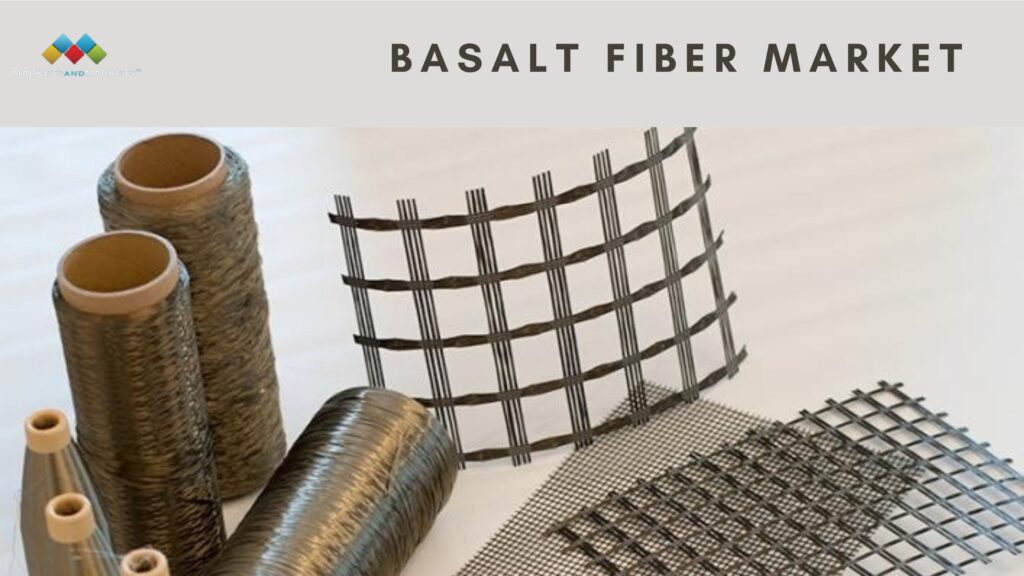Basalt Fiber Market: Transforming Construction, Automotive, Wind Energy, Electronics, and Marine Industries

Basalt fiber, a remarkable material derived from volcanic rock, is fast becoming an essential component across multiple industries. Its natural origin, combined with a suite of performance advantages, makes it a unique, eco-friendly alternative to traditional materials like fiberglass, carbon fiber, and steel. The basalt fiber market is booming, supported by an increasing demand for lightweight, durable, and sustainable materials in sectors such as construction, automotive, wind energy, electronics, and marine.
Understanding Basalt Fiber
Basalt fiber starts as basalt rock, which is melted and then extruded into fine fibers. Unlike synthetic fibers, basalt fiber is natural, which makes it an attractive choice for industries striving to meet green and sustainable goals. Besides being non-corrosive and thermally stable, basalt fiber also boasts impressive strength, making it ideal for heavy-duty applications where durability matters.
What’s Driving Market Growth?
Basalt Fiber Market is expected to grow significantly over the next several years, with a predicted valuation of USD 503 million by 2028, up from USD 279 million in 2023.
The global market for basalt fiber is set to expand rapidly due to several significant factors:
- Shift Towards Lightweight, High-Performance Materials
Across industries, there’s a strong focus on using lightweight materials that contribute to improved efficiency, lower emissions, and reduced costs. Basalt fiber’s combination of high tensile strength and low weight is leading it to replace heavier, more traditional materials, particularly in construction and transportation. - Commitment to Sustainability
More industries are aiming to reduce their carbon footprints, making basalt fiber an attractive solution. Since it’s derived from a naturally occurring material, its production has a lower environmental impact compared to synthetic fibers, aligning well with sustainability objectives in sectors like wind energy and automotive. - Reliable Performance in Harsh Conditions
One of the main reasons for the rising popularity of basalt fiber is its exceptional performance under extreme conditions. Basalt fiber is highly resistant to corrosion, temperature, and chemicals, making it perfect for challenging environments. This has huge implications for the marine, electrical, and electronics industries, where materials must withstand demanding situations. - Cost-Effective Alternative to Carbon Fiber
While carbon fiber is known for its strength, it’s also expensive, and that’s where basalt fiber shines. Offering comparable benefits at a fraction of the cost, basalt fiber is a budget-friendly option for industries like construction and automotive that are conscious of their bottom line but still need top-notch performance.
Expanding Applications of Basalt Fiber
Let’s look at how basalt fiber is finding its way into key industries, adding value through its durability, strength, and environmental benefits.
1. Construction and Infrastructure
In the construction world, basalt fiber is gaining popularity as a reinforcement in concrete structures, providing an alternative to steel rebars. Basalt rebar doesn’t corrode, handles thermal fluctuations well, and is lightweight, making it ideal for bridges, highways, and buildings exposed to severe weather. It’s also used in applications like soil stabilization, erosion control, and roofing solutions, where strength and longevity are key.
2. Automotive and Transportation
As vehicle manufacturers look to reduce weight to improve fuel efficiency, basalt fiber is proving to be a valuable asset. It’s increasingly being used in car body panels, engine parts, and other automotive components. Additionally, basalt fiber’s ability to dampen vibrations and insulate against heat makes it ideal for enhancing passenger comfort and safety in electric and hybrid vehicles.
3. Wind Energy
Wind turbine blades, one of the most vital components in wind energy generation, need materials that can endure high-stress environments. Basalt fiber’s fatigue resistance and ability to withstand constant exposure to harsh weather make it an ideal candidate for turbine blades. Its use here supports the renewable energy sector’s push for materials that align with long-term sustainability.
4. Electrical and Electronics
With its excellent insulative properties, basalt fiber is being adopted in electrical applications, where reliable insulation against heat and electricity is a must. It’s used in cables, circuit boards, and other components that require resistance to high temperatures and fire, making it especially valuable for safety-critical applications.
5. Marine Industry
Saltwater corrosion and UV exposure are ongoing challenges in marine applications. Basalt fiber’s durability in marine environments makes it perfect for use in ship hulls, decks, and underwater structures. Its resistance to biological degradation means it will last longer in these challenging environments, making it a wise choice for marine manufacturers.
What’s Next for Basalt Fiber?
Looking ahead, the basalt fiber market has a promising future as more industries recognize its value. Key advancements, such as improvements in manufacturing processes to reduce costs, will help make basalt fiber even more accessible.
Despite its growth, some hurdles remain. Production is still limited compared to more conventional materials like fiberglass. Increasing the availability of basalt fiber, building stronger supply chains, and raising awareness of its benefits will be crucial to fully unlocking its potential. Once these challenges are addressed, basalt fiber has the potential to reshape the materials landscape in many sectors.
To know more Download PDF Brochure :
Basalt fiber is set to make waves across construction, automotive, wind energy, electronics, and marine industries. With its combination of strength, durability, and sustainability, it is becoming an essential part of the solution for companies looking to innovate while also prioritizing environmental responsibility. As production scales up and research continues to improve its properties, basalt fiber is likely to become a mainstay in advanced materials.
For companies looking to stay competitive, investing in basalt fiber technology now could align with long-term goals of sustainability, resilience, and efficiency. The shift to basalt fiber is a step toward a smarter, greener future
24World Media does not take any responsibility of the information you see on this page. The content this page contains is from independent third-party content provider. If you have any concerns regarding the content, please free to write us here: contact@24worldmedia.com

